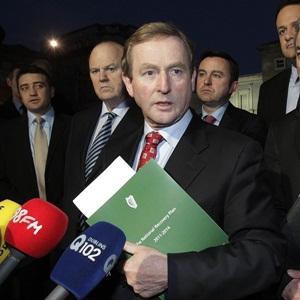Opposition delivering little cheer to voting public

A staggering 59% of Irish Times poll respondents felt the economy would be the same if Fine Gael and Labour had been at the wheel, writes Vincent Browne.
There is huge disillusionment with politics as politics is in Ireland now. A sense that the government is hopelessly incompetent and that the alternative government is hardly any better.
A large section of the electorate has not yet decided definitely how to vote in the next election. The vast majority do not want the person most likely to be taoiseach to be the next taoiseach. Even Labour supporters are not sure about their party. That is the message from the detail of the latest Irish Times/Ipsos MRBI poll, published last week.
Only 13 per cent of those polled (before undecided voters are excluded) said they would vote for Fianna Fáil in the next election, just 23 per cent they would vote Fine Gael, 18 per cent said they would vote Labour and 1 per cent said they would vote for the Greens.
So nearly half of those polled (45 per cent) said either they wanted some other non-establishment party, that they had no opinion or that they would not vote. Some 16 per cent said they had no opinion and 8 per cent that they would not vote.
Just 8 per cent are satisfied with the manner in which the government is running the country – one wonders what it is they are satisfied about. But, revealingly, 55 per cent of those who say they are going to vote Fianna Fáil are dissatisfied, which raises the question why are they going to vote Fianna Fáil? And, incidentally, 100 per cent of those who say they are going to vote for the Greens are dissatisfied!
Predictably, Brian Cowen has a net satisfaction rating (the satisfied percentage minus the dissatisfied percentage) of -69 per cent, which is quite an achievement. But the alternative taoiseach, Enda Kenny, has a net satisfaction rating of -39 per cent. In Dublin Enda Kenny has a net satisfaction rating of -42 per cent. By far the majority of those who say they will vote for the parties that offer themselves as the alternative government are dissatisfied with Enda Kenny.
There is no ecstatic enthusiasm for Eamon Gilmore either. His net satisfaction rating is just +4 per cent and in Dublin it is zero (43 per cent satisfied and 43 per cent dissatisfied). But more Fine Gael supporters are satisfied with him (52 per cent) than there are Fine Gael supporters satisfied with Enda Kenny (50 per cent). By the way, Gerry Adams has a net satisfaction rating of -20 per cent.
When the undecideds are removed from the poll results, 17 per cent say they will vote Fianna Fáil but only 11 per cent in Dublin, which if reflected in the election results and spread evenly across the Dublin constituencies means Fianna Fáil would win zero seats in the capital in the coming election. Sinn Féin support in Dublin is 15 per cent (without undecideds), they have 17 per cent in Munster and 19 per cent in Connaught-Ulster. Labour has 32 per cent in Dublin and Fine Gael 25 per cent.
But a warning: a third of those polled (34 per cent) said they may change their minds before the election – 43 per cent in Dublin. And the bad news for Fine Gael and Labour: 32 per cent of those who said they would vote for Fine Gael said they may change their mind and 44 per cent of those who said they would vote Labour said they may.
What I thought was the most revealing disclosure of the survey – a facet which got little attention even in the Irish Times – was that 59 per cent of those polled said that if Fine Gael and Labour had been in office for the last six months our economic situation would not be better than it is, but about the same – a further 9 per cent said it would be worse. And even more revealing, 50 per cent of those who said they were going to vote Fine Gael and 68 per cent who said they were going to vote Labour thought the situation would be no better or worse were either of those two in office.
There is real disillusionment among a large part of the electorate. A sense that an alternative government will do no better than the present one. A disillusionment with the leaders of the alternative government – and especially with the prospective taoiseach – and a willingness to change their voting intentions if an attractive option became available.
I heard Joan Burton on radio the other day responding to a question on why Labour would not consider going into power with Sinn Féin and left-leaning Independents. She said the priority was to give the country stable government. Not better, not fairer, not a government committed to making this society more equal, just stable government. And that is what the country will get in the coming election if some new, attractive option becomes available. And the perception of those polled is likely to prove true: the alternative government would make no difference.
Politics as usual, although of course the rhetoric will say the opposite.
